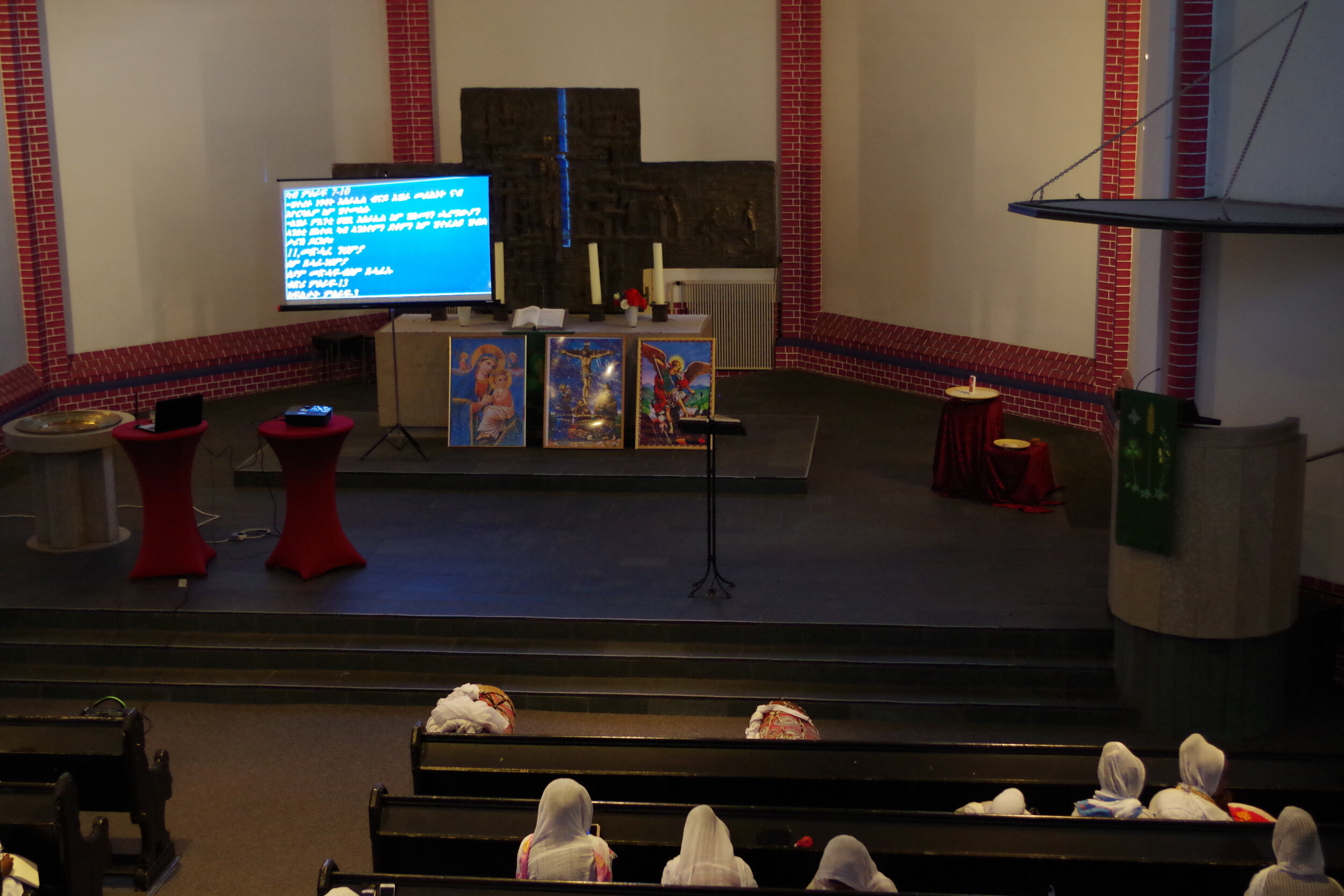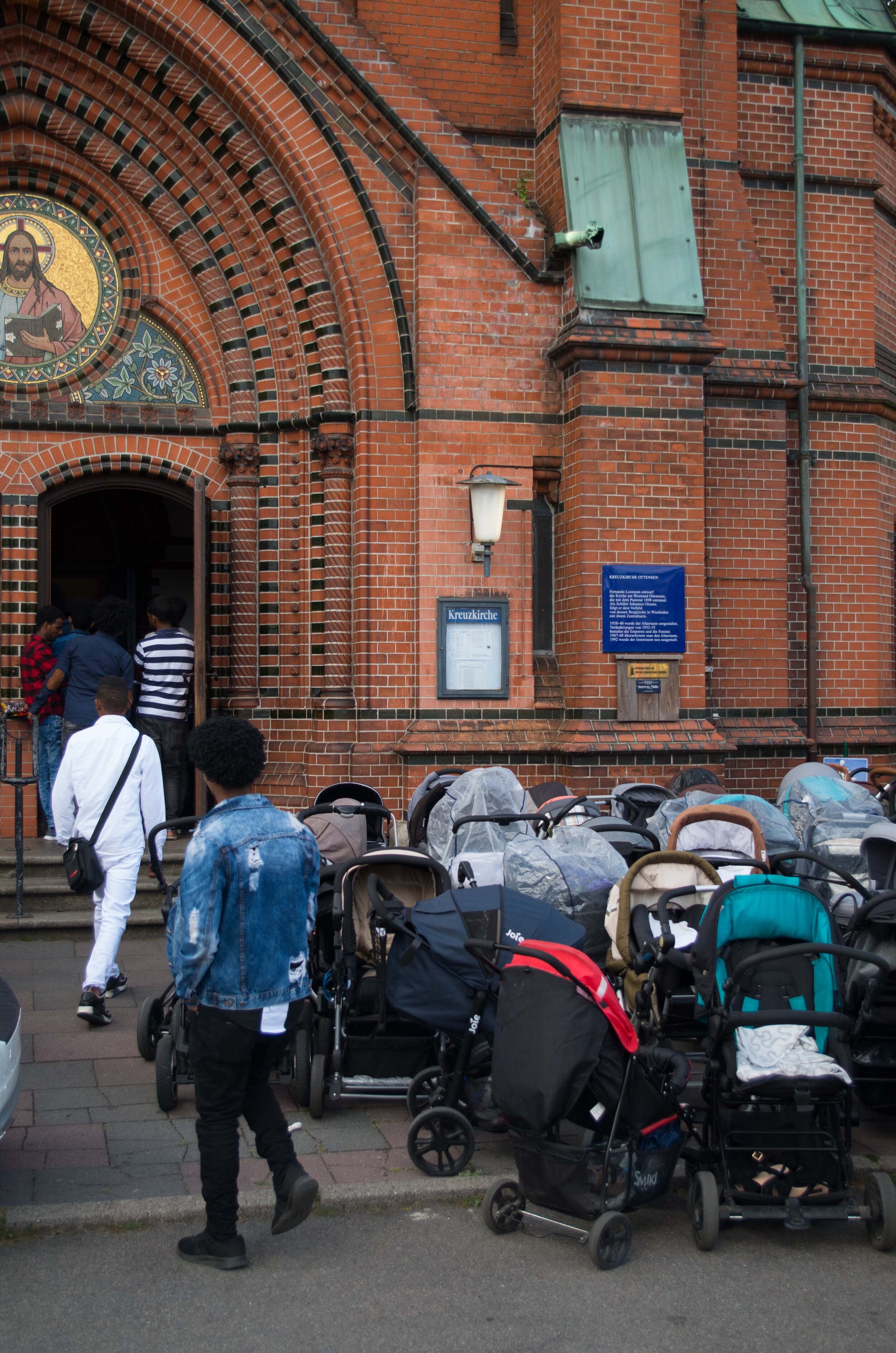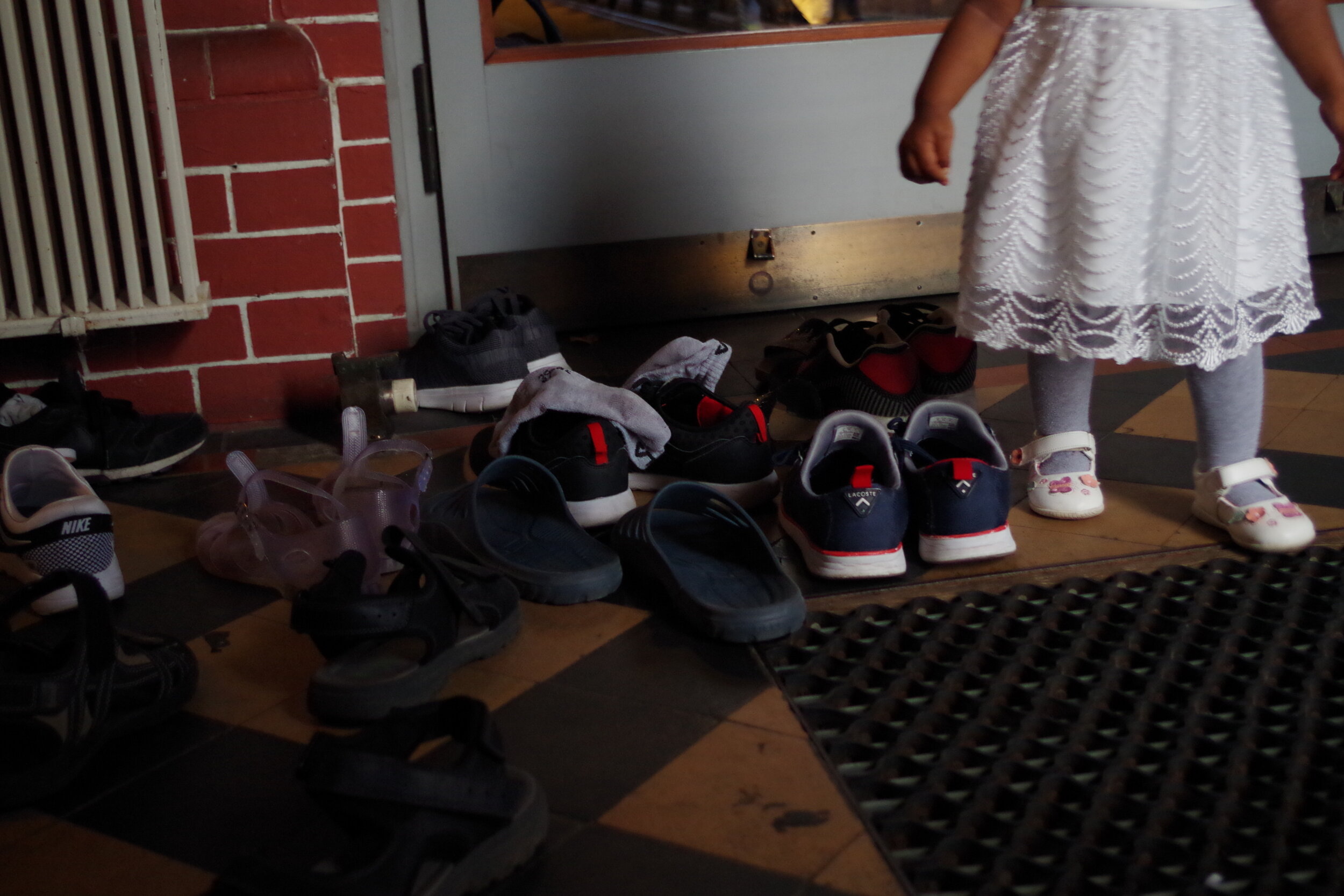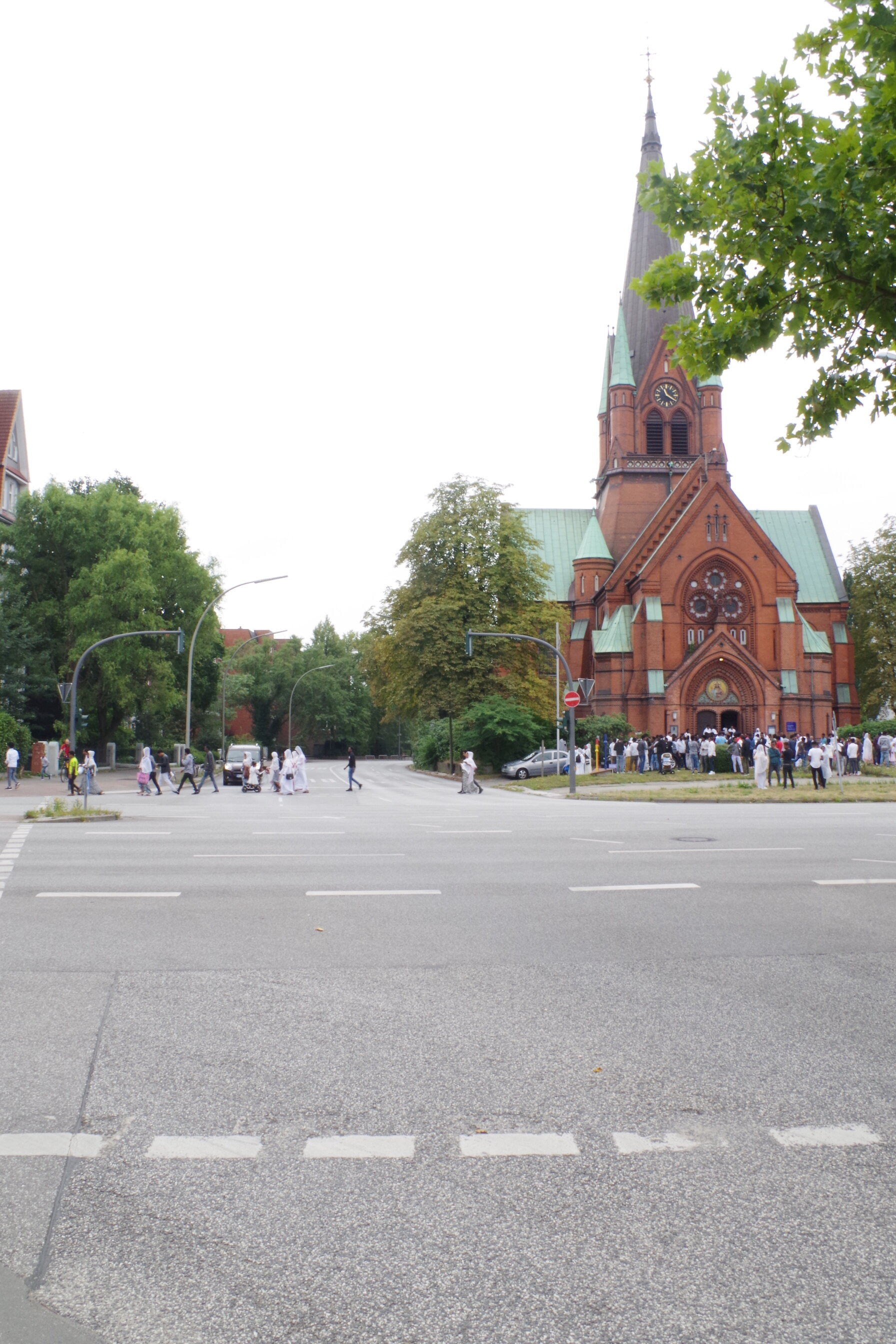This Eritrean Orthodox community is filling an empty church in Germany
The women sit separately from the men during part of an Orthodox Christian service. Photo by Jelena Malkowski.
HAMBURG, Germany — On a summer Sunday, the visitors of the Kreuzkirche (Holy Cross Church) in Hamburg are so scarce they barely fill six rows of the Protestant church. After the service, the mostly elderly visitors fit around three tables for cake and coffee.
But on a different Sunday, the same church is so crowded that people are standing next to the bench rows and in the doorway. The six-hour service this week includes three weddings and five baptisms. Most of the visitors, dressed in white, are in their twenties or younger. They are Eritrean Orthodox Christians. Most came to Germany only in the past few years.
When thinking of Germany and refugees, most would probably think of Merkel’s saying “wir schaffen das” (or “we can manage this” regarding Germany’s large intake of migrants) in 2015, of the Syrian civil war, and concerns about Muslims settling in Germany.
But it’s not just Muslims and not just people from the Middle East who have fled their home countries and come to Germany. The second largest group of refugees in Germany since 2015 are Eritreans – and 51% of Eritreans are of Christian Orthodox faith, according to the World Atlas.
Members of a Protestant church in Hamburg gather for their Sunday service. Photo by Jelena Malkowski.
Like the rest of Western Europe (except Poland), the amount of Christians in Germany has been declining for years. The Christian community is aging and dying, while many young people are leaving church and having fewer children, if any.
Between 2005 and 2018, the number of Christians in Germany, both Protestant and Catholic, holding church memberships dropped by 10% to 54% of the population. Only 10% of Germans attend weekly church services, according to Pew research. Meanwhile, the number of Eritrean Orthodox Christians in Germany is rising.
The Protestant church members gather for coffee and cake after service each Sunday. Photo by Jelena Malkowski.
A few years ago, the community of Eritreans in Hamburg was a mere 25-30 people, according to Tsegai Mebrahtu, chairman of the Eritrean Orthodox St. Michele community in Hamburg. A short, bald man with a friendly smile, Mebrahtu migrated from Eritrea in 1984 and has witnessed the growth of the church community since 2005.
The boom came in 2015, when Germany opened its borders. The state of human rights has been decaying in Eritrea since 1993, with their president crushing dissent and forcing citizens to provide military service. The U.N. estimates 8% of Eritrea’s population had become global refugees by 2016, with many trafficked as slaves in North Africa. A recorded 1,862 refugees came from the country in northeastern Africa to Hamburg from 2015 to 2018.
“I counted along until 850 members [of the church],” Mebrahtu said. Now the number exceeds that.
At the start, they met in an Orthodox chapel shared by the Coptic and Ethiopian Orthodox communities. The Eritrean Orthodox community was recognized in 1993, at Eritrea’s independence from Ethiopia, by the pope of the Coptic Orthodox Church of Alexandria. It’s considered a part of the Oriental Orthodox tradition, separate from Eastern Orthodoxy, Roman Catholicism and traditional Protestantism, primarily over their theology that Jesus Christ is one person with one dual, inseparable nature (divine and human) instead of one person with two natures. The dispute goes back to 451 A.D.
When the number of Eritrean members rose to several hundreds, they needed a new church.
Protestant communities in Hamburg had already lost most of their members. The two communities of the Kreuzkirche and another church nearby had so few members that they had to combine to afford services. They alternate between their two churches on Sunday mornings, leaving the bigger Kreuzkriche empty every other Sunday.
Still, a little luck or perhaps divine intervention was needed to bring an empty church and the Eritrean Orthodox community together. The Eritrean community asked the now deceased Martina Severin-Kaiser for help, who oversaw communication between different Christian communities in Northern Germany.
“She had the glorious idea to talk to her husband,” Mebrahtu said. Her husband Matthias Kaiser is one of the pastors in the community the Kreuzkirche belongs to. Since 2016, the Protestant community lends Kreuzkirche to the Orthodox community.
The locals in the neighbourhood are used to “the people in white garment” who visit their quarter every other Sunday. The large group of dark-skinned people dressed in their traditional white garments, the color of hope, attracts some attention in the town.
In the morning hours, starting from 5 am when the members enter the church one after another, the town square is still sleeping and doesn’t notice their arrival. But at noon, when the service lets out, hundreds leave the church. They like to mingle on the small green lawn in front or slowly amble to the metro station. They are remarkable to the older inhabitants.
The Eritrean church-goers mingle on the lawn after services, attracting the attention of passers-by who wonder what event is happening at the old, usually quiet, church. Photo by Jelena Malkowski.
“I have seen these people quite frequently in the afternoon hours and once in the early morning, when I came back from the fish market,” says Peter Schwanenwilms, a man with light grey hair, speaking in a strong Hamburg dialect. After he saw them in the early morning hours, he became curious and asked some of the members what they were doing in his town’s quarter so early. Now, he stands at the Kreuzkirche on Sunday morning at 9:30, observing the service.
When the Eritrean Orthodox community has their service, not just the community, but also the church itself changes. The altar is draped with purple velvet, and icons of St. Michael, Jesus and Maria are placed in front of it. The priests are not facing the community, but the icons as everyone else, praying in their native Tigrinya or the old Ethiopian Ge’ez and swinging a censer to waft incense.
“Oh! I remember the swinging of the censer from my youth,” Schwanenwilms said, watching the service. Back then he was a regular in church, but he left it years ago. Today, he visits the church out of curiosity.
“I wanted to see, what kind of multi-cultural and other religious life exists around here,” he says. Apart from the frankincense, he doesn’t recognize much else from his own church days.
Manuela Heyns, chairwoman of the Protestant church council, has visited the Orthodox service several times upon invitation. But even as a frequent churchgoer, she says the Orthodox service is a completely different atmosphere. “You feel like you are in another world,” she said.
The Protestant and the Orthodox services are truly very different – not just in language and visitors. The Protestant church members notice how the Orthodox devoutly worship even the walls of the church building as a holy place, while the newer Orthodox members wonder how the Protestant church service can end in less than two hours.
The stained glass of Hamburg’s Kreuzkirche (Holy Cross Church) depicts Jesus on the cross. Photo by Jelena Malkowski.
But both groups are open to visits of the other group and find the cooperation positive. Apart from using the same space, the communities also want to get to know each other: the Eritreans were invited to the parish feast of the Protestants, and they even organized a joint church service. The Eritreans enjoy learning about their new home country, while the long-time Protestant residents learn about Eritrean culture and Orthodox practices.
The Eritean-Germans who have lived in Hamburg the longest, like Mebrahtu, also help teach the new immigrants German and orient them to a new country and lifestyle, accompanying them to doctor’s appointments, government agencies and employment centers. Not many people in Hamburg speak Tigrinya.
“Us older members are now the supporting pillars of the community,” Mebrahtu said.
He also believes the church is a bedrock for the new immigrants, giving them friends and support.
"If we come to church and have the faith, that's also a protection," Mebrahtu added. "It is a protection for all those newly arrived, so that they do not get on the wrong track, but have a structure."
For this reason, the church schedules more events during the week like choir practices and Bible studies for those who are newly arrived and don’t know how to spend their days yet. Over time, everyday life in Hamburg becomes more and more demanding. They go to school, learn the language and start working. This new life in Hamburg leaves less time during the week to drive to the church from afar.
Still, the church fills up every other Sunday. They pray quietly and sing loudly. Small children run between the praying ones, and babies lie in baskets on the benches.
After the ceremony, they gradually spill out of the church and spread out again all over the city, to their new lives in Germany.









